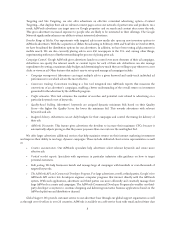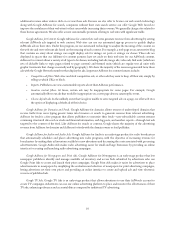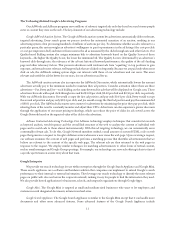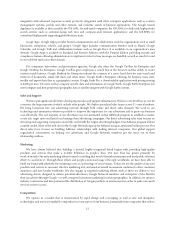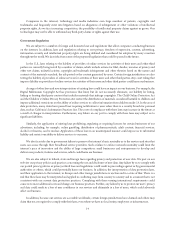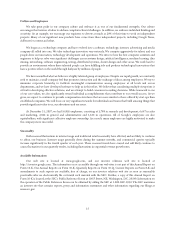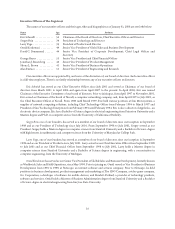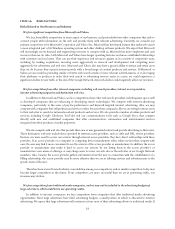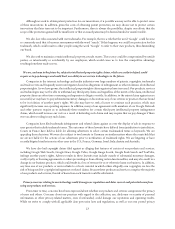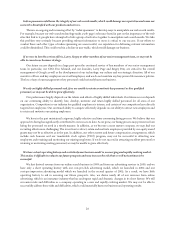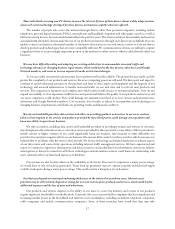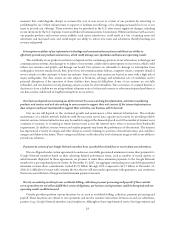Google 2007 Annual Report Download - page 32
Download and view the complete annual report
Please find page 32 of the 2007 Google annual report below. You can navigate through the pages in the report by either clicking on the pages listed below, or by using the keyword search tool below to find specific information within the annual report.ITEM 1A. RISK FACTORS
Risks Related to Our Business and Industry
We face significant competition from Microsoft and Yahoo.
We face formidable competition in every aspect of our business, and particularly from other companies that seek to
connect people with information on the web and provide them with relevant advertising. Currently, we consider our
primary competitors to be Microsoft Corporation and Yahoo! Inc. Microsoft has developed features that make web search
a more integrated part of its Windows operating system and other desktop software products. We expect that Microsoft
will increasingly use its financial and engineering resources to compete with us. Microsoft has more employees and cash
resources than we do. Also, both Microsoft and Yahoo have longer operating histories and more established relationships
with customers and end users. They can use their experience and resources against us in a variety of competitive ways,
including by making acquisitions, investing more aggressively in research and development and competing more
aggressively for advertisers and web sites. Microsoft and Yahoo also may have a greater ability to attract and retain users
than we do because they operate internet portals with a broad range of content products and services. If Microsoft or
Yahoo are successful in providing similar or better web search results or more relevant advertisements, or in leveraging
their platforms or products to make their web search or advertising services easier to access, we could experience a
significant decline in user traffic or the size of the Google Network. Any such decline could negatively affect our revenues.
We face competition from other internet companies, including web search providers, internet access providers,
internet advertising companies and destination web sites.
In addition to Microsoft and Yahoo, we face competition from other web search providers, including start-ups as well
as developed companies that are enhancing or developing search technologies. We compete with internet advertising
companies, particularly in the areas of pay-for-performance and keyword-targeted internet advertising. Also, we may
compete with companies that sell products and services online because these companies, like us, are trying to attract users
to their web sites to search for information about products and services. We also provide a number of online products and
services, including Google Checkout, YouTube and our communications tools such as Google Docs, that compete
directly with new and established companies that offer communication, information and entertainment services
integrated into their products or media properties.
We also compete with web sites that provide their own or user-generated content and provide advertising to their users.
These destination web sites include those operated by internet access providers, such as cable and DSL service providers.
Because our users need to access our services through internet access providers, they have direct relationships with these
providers. If an access provider or a computer or computing device manufacturer offers online services that compete with
ours, the user may find it more convenient to use the services of the access provider or manufacturer. In addition, the access
provider or manufacturer may make it hard to access our services by not listing them in the access provider’s or
manufacturer’s own menu of offerings, or may charge users to access our web sites or the web sites of our Google Network
members. Also, because the access provider gathers information from the user in connection with the establishment of a
billing relationship, the access provider may be more effective than we are in tailoring services and advertisements to the
specific tastes of the user.
There has been a trend toward industry consolidation among our competitors, and so smaller competitors today may
become larger competitors in the future. If our competitors are more successful than we are at generating traffic, our
revenues may decline.
We face competition from traditional media companies, and we may not be included in the advertising budgets of
large advertisers, which could harm our operating results.
In addition to internet companies, we face competition from companies that offer traditional media advertising
opportunities. Most large advertisers have fixed advertising budgets, a small portion of which is allocated to internet
advertising. We expect that large advertisers will continue to focus most of their advertising efforts on traditional media. If
18


